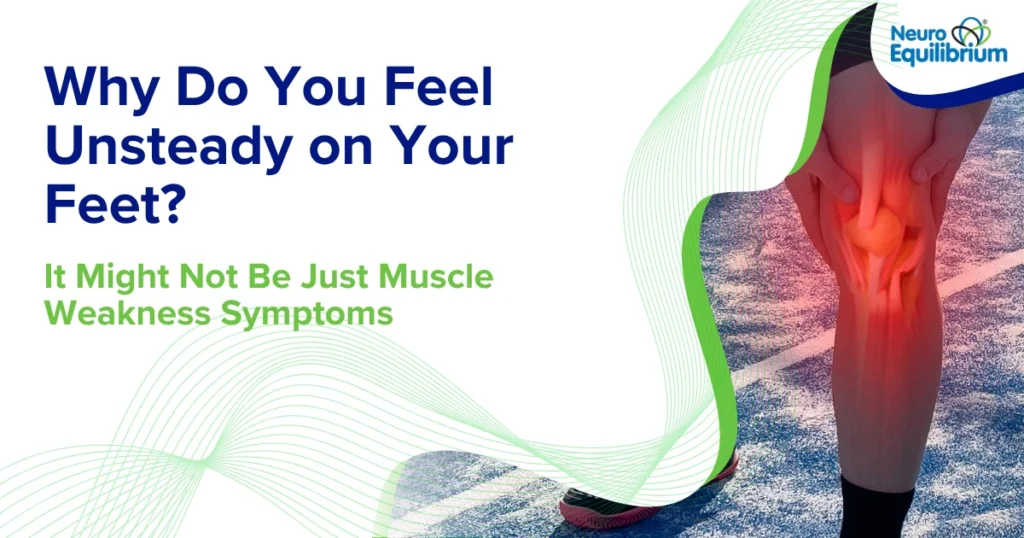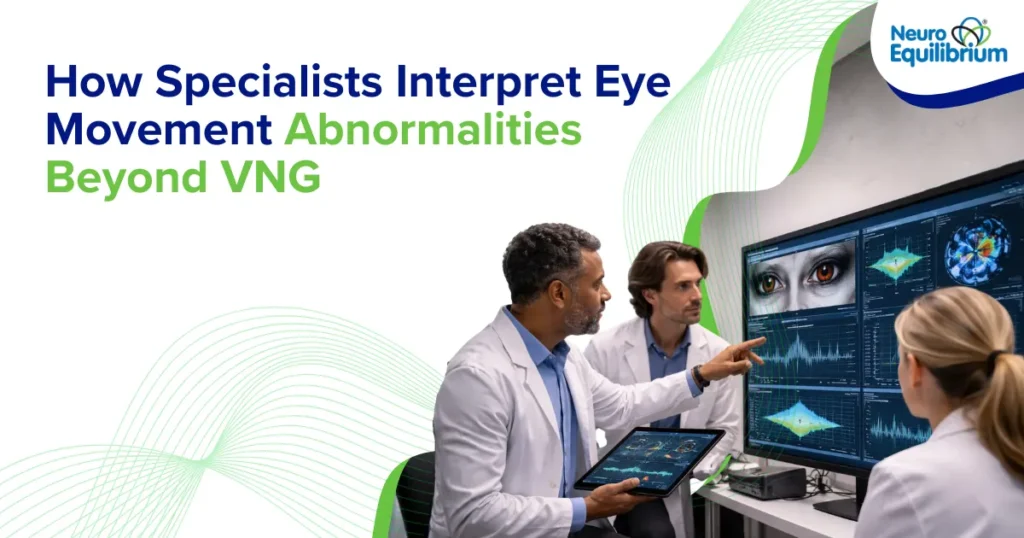Unsteadiness when on your feet is a typical concern, and it is often more complex than muscle weakness. Your equilibrium relies on an advanced mechanism that consists of your inner ear, brain, eyesight, and your body senses. When something is wrong with this system, you may feel dizzy, unsteady, or even spin around, what is commonly referred to as vertigo.
If you’ve been exploring why you feel unsteady or lightheaded, especially when you’re not feeling particularly tired or weak, you’re probably looking for some clear answers. We will try to help you understand the possible causes, which range from minor to serious. We will also try to explain the difference between unsteadiness caused by inner ear or neurological issues and general muscle weakness, highlight symptoms to watch for, and guide you on when it’s a good time to see a doctor.
Know More About Vertigo
- Do You Need a Vertigo Specialist?
- Difference Between VEMP and VNG Test for Vertigo Diagnosis
- Vertigo Test Cost in Bangalore: VNG, DVA, SVV & More
Symptoms to Look Out For
It is useful to know how you can explain what you feel. Do you have a spinning feeling (vertigo), feeling as though you are floating, swaying, being pulled in one direction, or lightheaded? Is it a case of your feet moving under you? These sensations are usually rather different than tiredness or some kind of muscle weakness, which you may think of, when you think about physical effort. Being aware of such patterns can assist you in reporting your symptoms to a physician.
Inner Ear Problems (Vestibular System)
Balance plays a big role in your inner ear. The following are some general causes of inner ear related to unsteadiness:
- Benign Paroxysmal Positional Vertigo (BPPV): This occurs when small calcium crystals of your inner ear become detached and dislodged into the wrong location. This is what makes you feel short and abrupt spinning whenever you make certain movements with your head, such as getting out of the bed or looking up.
- Meniere Disease: This is a disease that results in pressure of fluid accumulating in your inner ear and causes fullness in ear. It brings on attacks of dizziness, deafness, and tinnitus.
- Vestibular Neuritis/Labyrinthitis: It is an infection caused by bacterial/viral infection. They may cause severe vertigo, including nausea and occasional hearing loss. When untreated in a timely manner, labyrinthitis may occasionally lead to permanent deafness.
- Vestibular Migraine: You may have dizziness or vertigo with or without a headache. You might also be sensitive to motion, loud noises or bright lights. Screen time and stress may trigger it.
- Acoustic Neuroma: It is a non-cancerous tumor on the hearing and balance nerve. It may lead to progressive instability and loss of hearing.
Brain and Nerve Problems
Sometimes, unsteadiness comes from problems in the brain. While less common, these can be more serious:
- Stroke, Multiple Sclerosis (MS), or Tumors: These conditions can affect the parts of your brain that control balance. They might also come with other signs like double vision, trouble speaking, or numbness.
- Epilepsy (in children): In rare cases, epilepsy can cause vertigo in children.
It’s important not to panic, but do see a doctor if your unsteadiness comes with symptoms like double vision, speech problems, or numbness.
VNG Test Price in Bangalore
Typical Cost Range
VNG test costs around 2000-5000 in Bangalore. The prevailing cost varies according to the location of the test, the added balance or hearing tests, and the degree of medical competence.
Factors Affecting the Cost
- Type of Facility
- Multi-specialty hospitals: Provide complex diagnostic facilities, typically under the supervision of a neurologist or ENT. Price typically ₹4000–₹5000.
- Independent diagnostic laboratories: Do standard VNG evaluations with reduced overheads. Price range ₹2000–₹3000.
- Test Components
- Basic VNG only: Lower price bracket.
- VNG + audiometry / vestibular rehabilitation assessment: Increases overall cost.
- Location & City Tier
- Metro hubs like Bangalore generally charge more than smaller cities due to infrastructure costs.
- Doctor’s Expertise
- Tests supervised by ENT specialists or neurologists are priced higher than those performed solely by technicians.
When to Consider a VNG Test
Doctors can order this test when you have:
- Constant lightheadedness or whirling feelings.
- Lots of daily safety imbalance or falls.
- Hearing loss and tinnitus.
- Nausea or motion sickness without an apparent cause.
General Health and Medical Reasons for Unsteadiness
Not all causes of unsteadiness directly involve your ear or brain however, they do influence your balance:
- Postural Hypotension: This is where your blood pressure drops at an instant when you get up, and you become lightheaded or unbalanced.
- Side Effects of Medications: A lot of medications may lead to dizziness or light-headedness, making it even worse when you take multiple drugs. These are sedatives, blood pressure drugs, some allergy drugs, including some antibiotics.
- Undiagnosed diseases: Infections, dehydration, anemia, or heart issues may make you feel unwell in general, and contribute to unsteadiness, which may resemble muscle weakness.
- Loss of Vision or Hearing: Your balance can be impaired by poor vision (due to cataracts or other reasons) or hearing loss, which may increase with age.
- Balance Issues in Older Adults: Older people are more vulnerable to falls when they experience memory problems or slowness of reaction.
Psychological and Lifestyle Factors
Balance problems may be exacerbated by anxiety, fear of falling and social withdrawal. When you are dizzy over some time, these psychological aspects may cause the cycle that makes you dizzy chronically.
Nutrition
Lack of some nutrients, such as Vitamin D, B12, and Magnesium may interfere with nerve health, brain functioning, and blood pressure, which could contribute to balance problems. These deficiencies do not always cause problems with balance, but they can exacerbate the problem.
Muscle Weakness vs. Inner Ear/Brain Causes: Making Sense of the Difference
General weakness may be easily confused with balance system issues. Muscle weakness is physical and tends to develop gradually. You may experience some trouble with lifting objects, going up stairs, or have some general body fatigue. Instead, unsteadiness caused by inner ear or brain problems is usually abrupt, position-induced, or accompanied by sensory symptoms such as spinning, lightheadedness, which are not normally associated with muscle weakness. During a diagnosis, a doctor can assist in making the distinction.
Here’s a quick overview of how these two causes differ:
| Feature | Unsteadiness due to Muscle Weakness | Unsteadiness due to Vestibular/Neurological Causes |
| Onset | Often gradual, worsening over time | Can be sudden or episodic, often triggered by movements |
| Sensation | Feeling of physical weakness, difficulty lifting/moving | Spinning, swaying, floating, lightheadedness, disorientation |
| Associated Symptoms | Muscle fatigue, pain, difficulty with physical tasks | Nausea, vomiting, hearing changes, vision issues, headache |
| Triggers | Prolonged activity, standing, general exertion | Head movements, changes in position, visual stimuli, stress |
| Improvement | Rest, strengthening exercises | Repositioning maneuvers, specific medications, balance rehab |
When to See a Doctor
You should see a doctor if your symptoms are frequent, getting worse, or if they come with hearing loss, speech problems, or vision changes. Not addressing these symptoms can lead to worse balance and falls.
How Doctors Figure Out What’s Wrong
The experts such as ENT doctors or neuro-otologists will look at your health history, conduct a physical examination, and employ particular tests. Such tests may involve Videonystagmography (VNG), Subjective Visual Vertical (SVV) and Dynamic Visual Acuity (DVA). With these tests, the doctors are able to accurately diagnose the cause of your unsteadiness, distinguishing it with other problems such as muscle weakness.
Treatment Options
Treatments depend on what’s causing your unsteadiness:
- BPPV: Straight forward repositioning maneuvers like the Epley maneuver are usually employed.
- Vestibular Migraine: It may require lifestyle changes, medication and control of screen time.
- Vestibular Neuritis: It may include medicine, and balance training.
- Meniere Disease: Can be treated with diet (low sodium), fluid intake and medication.
- Vestibular Rehab Therapy (VRT): This type of therapy entails the special exercises, which involve the use of virtual reality to restore your balance.
The good news is that with the right diagnosis and treatment, recovery is often possible.
How NeuroEquilibrium Can Help
NeuroEquilibrium is a discipline where there is a concentration on treating imbalances and vestibular disorders. Our nationwide network of clinics possesses the latest system of vestibular testing which is run by the neurologists and therapists who have the utmost level of training. We offer:
- The correct diagnosis with the use of thorough vestibular examinations
- Customized treatment plans according to your symptoms and condition
- Access to more advanced programs of VRT at home such as virtual reality modules
- The follow-up and additional treatment to ensure that your recovery will be followed and treatment should be changed according to the situation.
NeuroEquilibrium offers you the personal and science-based solution you require to get your balance back and your life back.
Conclusion
Unsteadiness should not be regarded lightly. Although it is natural to think it is being tired or having weak muscles, but sometime the main cause is usually rooted in the complex balance system with its inner ear, brain, and nervous system. Left unaddressed, balance problems may result in the increased risk of falls, the experience of continuous anxiety, and the deterioration of the overall quality of life.
Luckily, the majority of the balance disorders are capable of being diagnosed properly and treated successfully with medical skills and sophisticated diagnostic instruments. Quick treatment may have a profound effect on recovery and long-term results.
When you or a loved one are feeling dizzy regularly, unsteady, or have vertigo, it is vital to get specialized care.
NeuroEquilibrium provides detailed evaluation and customized treatment to help restore balance and improve day-to-day living.
Sources
- National Institute on Deafness and Other Communication Disorders (NIDCD). (2018). Balance Disorders — Causes, Types & Treatment. https://www.nidcd.nih.gov/health/balance-disorders (NIDCD)
- MSD Manual. (n.d.). Dizziness and Vertigo (Ear, Nose, and Throat Disorders). https://www.msdmanuals.com/home/ear-nose-and-throat-disorders/symptoms-of-ear-disorders/dizziness-and-vertigo (MSD Manuals)
- Better Health Victoria. (n.d.). Dizziness and Vertigo — Symptoms, Causes & What to Do. https://www.betterhealth.vic.gov.au/health/conditionsandtreatments/dizziness-and-vertigo (Better Health Channel)
- Harvard Health Publishing. (2025). Balance Problems: Causes, Diagnosis & Improvement Tips. https://www.health.harvard.edu/topics/balance (Harvard Health)
- Physio-Pedia. (n.d.). Vestibular Treatment. https://www.physio-pedia.com/Vestibular_Treatment (physio-pedia.com)
What causes unsteadiness if it’s not muscle weakness?
Inner ear diseases, brain illness, drug side effects or neurological syndromes may also result in unsteadiness, not simply weak muscles.
How do I know if my balance issue is from the inner ear?
If you feel as if you are spinning, swaying or dizzy due to movement of your head, you might have a vestibular issue like BPPV or Meniere disease.
When should I be concerned about feeling unsteady?
Unsteadiness that occurs often, worsens, and is accompanied by loss of hearing, slurred speech, or vision should be seen by a doctor.
Can anxiety or stress cause balance problems?
Of course, Dizziness and lack of balance all the time can be related to anxiety or fear of falling, and the chain of events continues.
How are balance disorders diagnosed and treated?
Tests like VNG or SVV help doctors diagnose the cause. The treatment includes vestibular rehabilitation, medications and positioning.
















